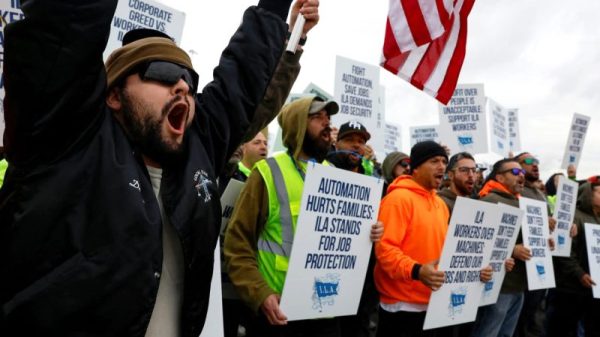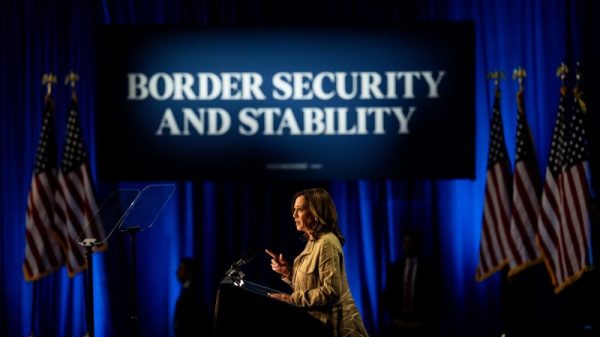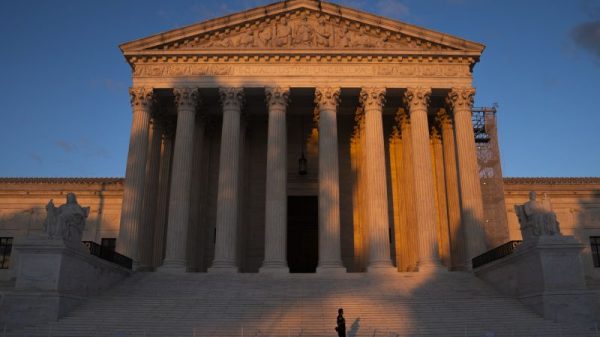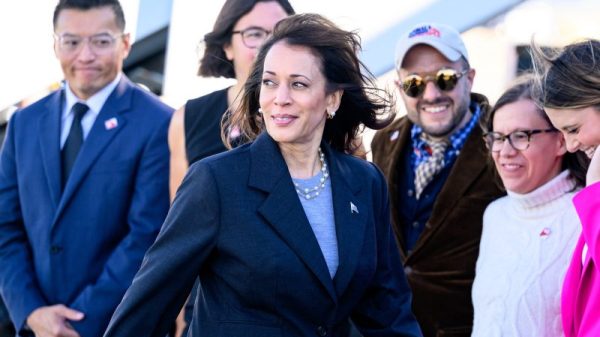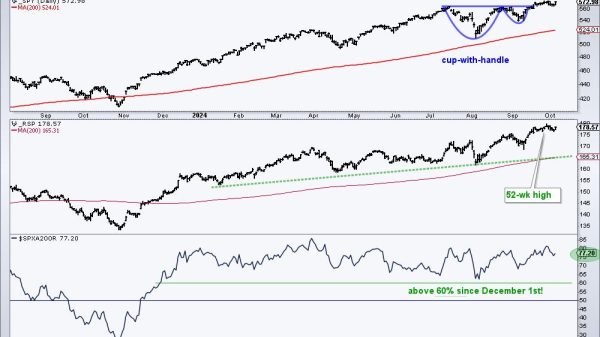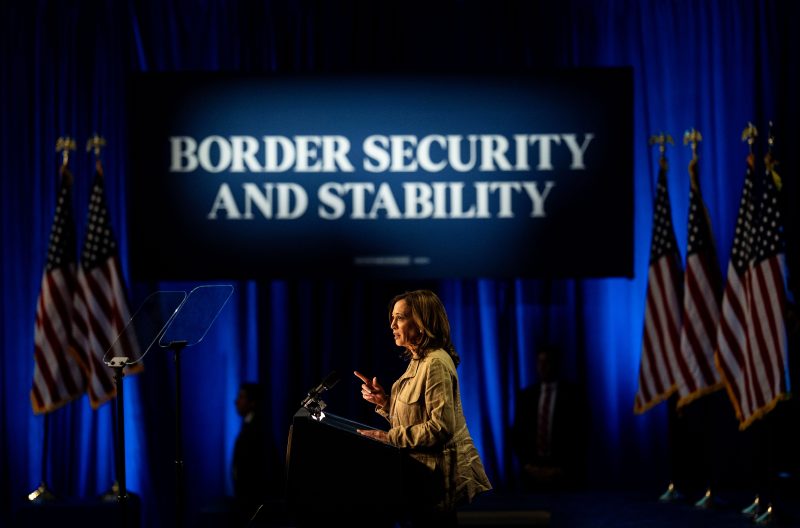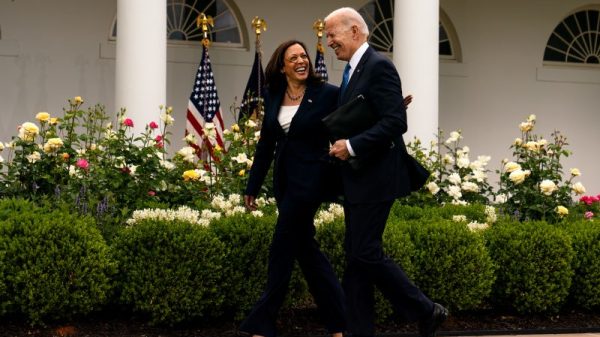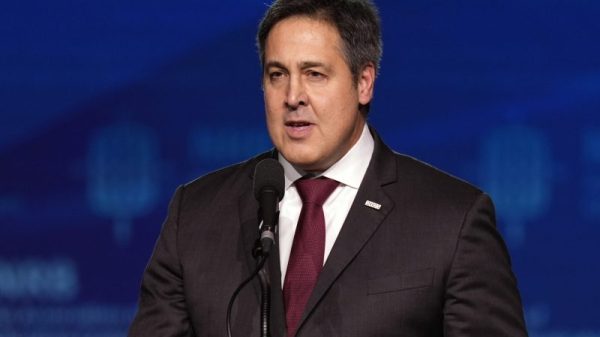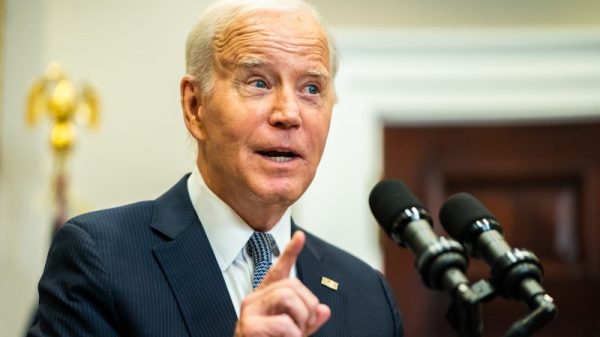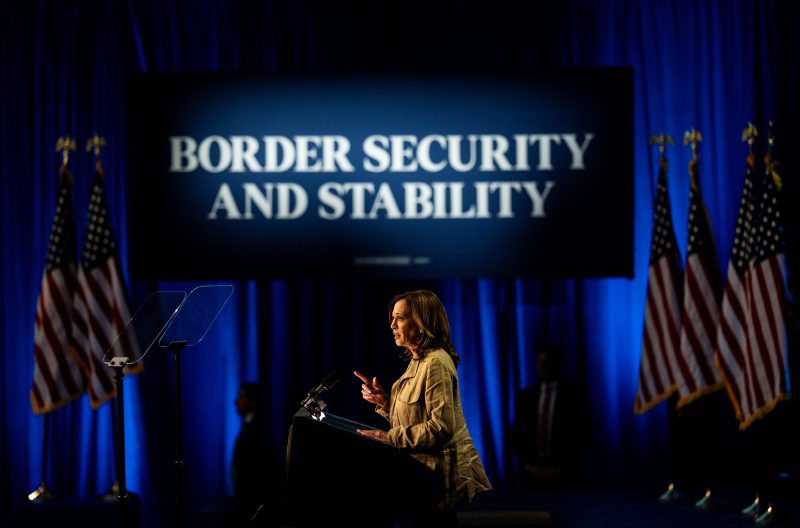
On President Joe Biden’s first day in office, he fulfilled a campaign promise and cheered immigration advocates by introducing a sweeping bill that offered a path to legalization for millions of undocumented immigrants.
Vice President Kamala Harris is touting a starkly different legislative priority in her upstart campaign: She is pledging to sign into law “the toughest bipartisan border security bill in decades,” one without any route to citizenship.
The dynamic, which some immigration advocates have found unsettling, reflects the fast-evolving politics of the border since Harris ran for the presidency five years ago on a pledge to treat migrants more humanely and decriminalize illegal crossings. But as former president Donald Trump campaigns on anti-immigrant rhetoric and promises of mass deportation, longtime immigration activists have largely refrained from publicly criticizing Harris for her lurch toward a more enforcement-focused policy.
Their restraint reflects a deep fear of what a Trump win would mean for immigration. Many advocates say they are reluctant to level any criticism that could hurt Harris during the election, even as they plan for an all-out fight to shape her policy afterward.
The strategy is temporarily masking a debate in the Democratic Party that is certain to erupt into view should Harris win, as Democrats who want the party to embrace tougher border promises in recognition of the public’s hardening views clash with those who believe a more welcoming approach is at the core of the party’s identity.
“The threat that Trump represents is existential, so the first order of business is to make sure that he gets defeated,” said Vanessa Cardenas, executive director of the immigration advocacy group America’s Voice. “And come January, February of next year, we can have a conversation about the kind of policy interventions we’ll need, hopefully under a Harris administration.”
The trend is also playing out among other activists focused on liberal issues like climate change, gun control and criminal justice reform, as divisions over policy take a back seat to the drive to defeat Trump. Liberal groups and lawmakers have generally kept quiet as Harris pointedly shifts to the center, at least tonally, on fracking, firearms and other matters, accepting the strategy as necessary to win over moderate voters but planning to resume vociferous public lobbying should she win.
Trump has noted this dynamic in his own way, asserting that Harris is adopting moderate positions for political expediency but would enact leftist policies as president, especially on immigration. “Everything that she believed three years ago and four years ago is out the window,” he said at the Sept. 10 presidential debate as he repeatedly attacked Harris on border issues. “But if she ever got elected, she’d change it, and it will be the end of our country.”
The truce between candidate and activists is driven by Trump’s often startling rhetoric on immigration. He has promised detention camps and mass deportations. He has said immigrants are “poisoning the blood of our country.” He has targeted a community of immigrants with legal status in Springfield, Ohio, saying at a rally in Pennsylvania, “You have to get them the hell out!” as the crowd chanted, “Send them back!”
Republicans have spent more than $472 million on immigration-related ads this year, according to an analysis of AdImpact data by America’s Voice. And it appears to be working: A recent Reuters-Ipsos poll found Trump with an 11-percentage-point advantage over Harris on whom voters trust to handle immigration, 44 percent to 33 percent.
In adopting a tougher tone, Harris has leaned on her record as California’s attorney general, stressing her prosecution of transnational gangs and efforts to combat drug trafficking. Her campaign has run ads picturing her in front of the border wall, depicting her as a “tough” vice president who backs strict controls on migration. Those ads do not mention any plans to offer legal status to some undocumented immigrants who have been in the country for decades, although Harris embraced that idea at times on the campaign trail.
Harris recently visited the border town of Douglas, Ariz., promising to enact new border restrictions that would go further than the emergency rules the Biden administration deployed in June. Harris also gave a brief nod to offering longtime immigrants an opportunity to earn citizenship.
“She has led with border security because that has been what Republicans have tried to hammer her on,” Democratic strategist Maria Cardona said, noting that Harris’s support for a tough border bill does not preclude her from embracing pro-immigrant policies as president.
The Harris campaign did not respond to a request for comment.
Some immigration advocates say they wish Harris would use her platform — and her identity as the child of immigrants — to defend foreign-born residents more forcefully. During the presidential debate, Harris repeatedly expressed astonishment and dismay at Trump’s statements regarding immigrants, particularly his false claims that Haitian immigrants in Springfield were eating their neighbors’ pets. But the she did not mount the kind of defense of immigration and asylum protections that were a theme of her 2019 presidential run.
Harris offered a more full-throated defense a week later during an interview with the National Association of Black Journalists, calling the attacks on Springfield by Trump and his running mate, Sen. JD Vance of Ohio, “a crying shame.” But on the campaign trail, she has often tackled immigration not by discussing its benefits, but by slamming Trump for tanking the bipartisan bill that would have cracked down on border crossings and restricted access to the U.S. asylum system.
That legislation included nearly $20 billion to hire more U.S. border agents and immigration judges, along with a major expansion of detention and deportation capacity. As Biden pushed for the bill this year, he stressed that it would allow him to effectively “shut down” the border when unauthorized crossings reach a certain threshold.
The enforcement-heavy message would almost certainly have prompted an outcry from Democrats earlier in Biden’s term, when party leaders regularly insisted that any stepped-up enforcement must be paired with a pathway to citizenship for immigrants living illegally in the United States long-term.
But the scenes of chronic disorder at the southern border during Biden’s first three years pushed public sentiment to the right, and polls suggest growing support for large-scale deportations and other restrictive policies backed by Trump. Biden, meanwhile, has addressed some liberal concerns by opening more legal pathways for immigrants to enter the country or gain legal status.
Concerns about immigration have risen sharply this year, with half of Americans saying the influx of immigrants and refugees is a “critical threat” to U.S. interests, up from 42 percent last fall and the highest level since 2010, according to a poll released in August by the Chicago Council on Global Affairs.
Biden has worked closely with Mexico to stop migrants en route to the United States and has reduced their access to the U.S. asylum system if they cross the border illegally. As a result, unlawful border crossings have plummeted to the lowest level in four years, lower than when Trump left office.
Several of Biden’s new restrictions made up core elements of the stalled bipartisan bill. The president implemented them via executive action in June after the legislative route failed, which leaves the measures on shakier legal footing.
Not all advocates are keeping their silence amid the Biden-Harris crackdown. The American Civil Liberties Union and other immigrant advocacy organizations, for example, are challenging Biden’s asylum restrictions in court.
But the overall tone has been decidedly muted. Rafael Collazo, executive director of the UnidosUS Action Fund, a Latino political action committee, said most Latino voters support a “balanced approach” that “respects immigrants as human beings.” Such an approach, Collazo said, would combine “necessary and thoughtful enforcement” with “relief for the long-term undocumented.”
Cardenas, however, said she would prefer that Harris talk more about the latter. “I’m hearing a lot about the border,” she said. “But I need to hear more about legalization, about pathways.”
Many advocates also take issue with Harris’s promise to revive the bipartisan border bill, saying liberal priorities must be added before it would be acceptable to them. “We can have conversation around advocating for a revised version of that bill, because there are things we certainly would like to see, with legalization front and center,” Collazo said.
One analyst who works with immigration advocacy organizations said some groups, but not all, have embraced rhetoric about a “balanced” approach because they realize the debate has shifted.
“The divide I’m seeing is between groups that have done public polling on border and the ones who have not,” said the analyst, who spoke on the condition of anonymity to assess political allies.
“The public really wants border to be handled, and Harris is echoing what the polling found,” the analyst said. “It’s not cruel-hearted or fully hard-line, but people want order at the border.”
That divide on the left resembles in some ways the split on the right among antiabortion groups. Some have adopted a more centrist message in deference to most voters’ support for reproductive rights, while others contend that any compromise betrays a basic value.
Mark Krikorian, executive director of the Center for Immigration Studies, a Washington-based group that wants to reduce immigration, said groups aligned with Democrats “are willing to bite their tongues in order to not hurt Harris.”
“They know they’ll get more of what they want if Harris wins,” Krikorian said. “But most of her stepping back from anti-borders positions is Kabuki because the people she would appoint or keep in place are going to mostly do what the activist groups want.”
Tom Warrick, a former Department of Homeland Security official who served under both Democrats and Republicans, said neither party has fully adjusted to the new reality of lower migration numbers and a relatively quiet southern border in 2024. “The Republicans don’t acknowledge it, but Democrats don’t want to seem to claim credit for it, either,” he said.
Warrick, now a senior fellow at the Atlantic Council, said Biden officials initially believed the border could be fixed with more humane policies, only to realize they needed an accompanying surge in enforcement funding. “The policies they thought were the right ones had operational consequences, and that meant they needed more money — a lot more money,” he said.
Regardless of whether Harris or Trump wins, the real debate about the nation’s immigration policy will probably start afresh after the election, said Efrén Olivares, director of strategic litigation and advocacy at the Southern Poverty Law Center.
“At this point, I don’t think the conversation about immigration is about the merits of reform — it’s about an election in less than two months,” Olivares said. “The immigration reform conversation always ramps up in the months before an election. And in the months after a new administration takes over, that’s when the conversation should happen.”
Emily Guskin and Scott Clement contributed to this report.


